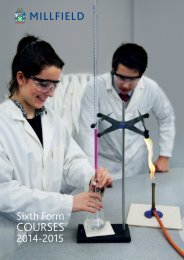COURSES
You also want an ePaper? Increase the reach of your titles
YUMPU automatically turns print PDFs into web optimized ePapers that Google loves.
Chemistry<br />
Overview<br />
“What in the world isn’t Chemistry”<br />
Chemistry is central to an understanding of natural<br />
phenomena and the creation of useful products.<br />
Chemists are at the forefront of research in new<br />
technologies in medicine, materials, food and<br />
alternative energy production. It is because of this<br />
key role in emerging markets that employment<br />
prospects are good. However, it is important to<br />
remember that the skills acquired in Chemistry are<br />
applicable to many different and varied career<br />
choices; not all chemists wear white coats.<br />
The A level course at Millfield is designed specifically<br />
to ensure that learning the subject is, where possible,<br />
practically based. The modern syllabus builds on<br />
the ‘How Science Works’ topics started at GCSE, but<br />
not at the expense of a fundamental understanding<br />
of key principles. The knowledge gained and<br />
competencies acquired in Chemistry are transferable<br />
to many subjects. In short, the course offers a good<br />
preparation for life at university.<br />
Approach<br />
Many skills are developed throughout the course,<br />
such as mathematical problem solving, analysis and<br />
evaluation. There are frequent opportunities to<br />
develop practical skills. Group sizes are typically<br />
10-12 at AS level, and each group has two tutors.<br />
The course is well supported by syllabus-specific text<br />
books and it is expected that you will spend time<br />
reading these to consolidate your own notes. The<br />
department is housed in a new state-of-the-art<br />
building that has its own computer suite and Sixth<br />
Form study room, in addition to teaching labs.<br />
Course outline<br />
You will already be familiar with some topics in this<br />
course since many are common to GCSE, but they<br />
are now studied in much more depth.<br />
AS<br />
Unit 1: Covers foundation subjects such as atomic<br />
structure, periodicity and organic chemistry.<br />
Unit 2: You will work up to topics like kinetics,<br />
alkenes and analytical techniques.<br />
Unit 3: Takes place throughout the year and is<br />
dedicated to investigative and practical skills; it is<br />
‘How Science Works’.<br />
A2<br />
Unit 4: Introduces you to topics including<br />
equilibria, polymers and aromatic chemistry.<br />
Unit 5: Covers thermodynamics, energetics and<br />
inorganic chemistry.<br />
Unit 6: (Like Unit 3) is the practical, hands-on part of<br />
the second year.<br />
Weekly lunch-time workshops are also available to<br />
provide additional support. The course is assessed by<br />
a combination of exams at the end of the year and<br />
an externally marked practical completed during<br />
lesson time.<br />
26<br />
Millfield Sixth Form Courses 2014-2015



